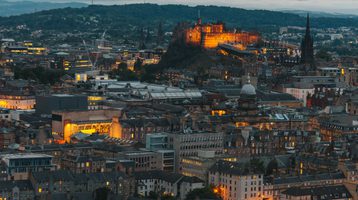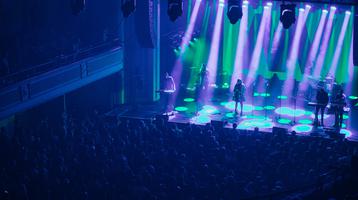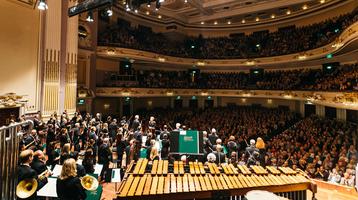
Our history
About UsOur history
In 1947, after the devastation of World War II, the founding vision for the Edinburgh International Festival was to reunite people through great art. In that first year, people overcame the post-war darkness, division and austerity in a blooming of festival spirit. Over the past eight decades, that same vision has ignited an astonishing breadth of thrilling cultural experiences across the arts.
According to festival folklore, the idea for the Edinburgh International Festival was born one starry night in 1942, when our soon-to-be first director Rudolf Bing and soprano Audrey Mildmay were strolling down Princes Street after watching a performance of John Gay's The Beggar's Opera. Edinburgh Castle was bathed in moonlight. Audrey said wistfully that the Scottish capital would be a wonderful setting for a festival.
The truth was more prosaic. Rudolf Bing was Glyndebourne's General Manager and he was seeking a solution to a financial squeeze in the middle of the war. Other factors gave the idea even greater urgency and poignancy. In 1942, the full horrors of the war were yet to be discovered. The homes of old arts festivals in Salzburg and Munich had been colonised by the Nazis – and then were bombed by the Allies. The Old Vic in London was blitzed. A new home was needed for the world's great artists, inspiring beleaguered audiences from across the globe. With its numerous artistic facilities, ancient beauty, safe atmosphere and compact centre, Edinburgh was the perfect candidate.
As World War II ended, the founding vision for the Edinburgh International Festival became even more compelling. Rudolf Bing, the Lord Provost John Falconer, City of Edinburgh Council and the British Council worked on their proposal. They wanted to reconcile people after the war, to let great art refresh souls and transcend all political and cultural boundaries.
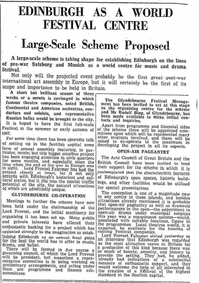
The Scotsman, Saturday 24 November
On Saturday 24 November 1945, the plan for an International Festival in Edinburgh was announced in three newspaper articles in The Scotsman and the Evening Dispatch, which later became the Evening News. An avalanche of letters from Edinburgh residents arrived on editors' desks, both for and against the notion of a festival.
Most people were enthusiastically in favour of the idea. The response confirmed the desire for a spectacular celebration of the ‘flowering of the human spirit', the founding vision expressed by the Lord Provost in the aftermath of a harrowing world war.
As the first Festival approached in 1947, rations were still in place and the Minister for Fuel and Power banned floodlighting the castle at the inaugural International Festival. But the people of Edinburgh felt differently. They wanted visitors to appreciate their magnificent castle, floodlit at night. Hundreds of letters and telegrams poured in with generous offers to donate coal rations.
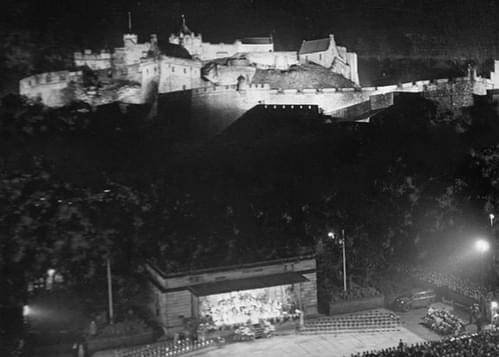
Edinburgh Castle lit up for the inaugural International Festival in 1947
© 1947 Paul ShillabeerThe Minister had no choice but to relent. The castle was lit up using Edinburgh's private coal rations for four nights from dusk to midnight during the International Festival, and visitors from all over the world felt warmly welcomed by the whole city.
From the very beginning, the people of Edinburgh rallied enthusiastically to welcome the world. Volunteers manned the Festival Club, which prepared and cooked 2,500 meals every day for visitors, while the Festival Society liaised with the Ministry of Food to ensure a sufficient supply of ingredients.
The atmosphere of austerity was banished as residents transformed the city with decorated shop fronts, magnificent floral displays and flags and pennants flapping on every available spot. Eight uninvited theatre groups turned up at the first International Festival, spawning the Festival Fringe. Topping it all, the sun shone gloriously for three continuous weeks.
It was of the utmost importance and most to be desired that all the ties which had been torn should be re-united… What you have seen here in Edinburgh is one of the most magnificent experiences since the war. Here, human relations have been renewed.Bruno Walter
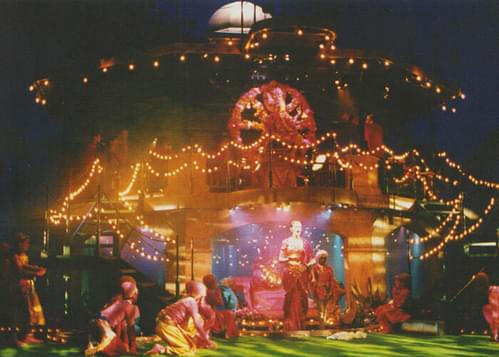
Baz Luhrmann's staging of Benjamin Britten's A Midsummer Night's Dream, performed in 1994 by the Australian Opera
Since that first Festival, we've welcomed a constellation of stars, numerous acclaimed productions and notable world premieres, as well as the innovative and the avant-garde. Always reflecting the cultural conversation of the day, our relationships with a huge range of artists and organisations have blossomed over decades, from the radicalism of the Old Vic to the psychologically raw choreography of Pina Bausch. And every August, cultures, life stories and experiences from all over the world are exchanged in Edinburgh.
Festival Directors
1947–1949: Sir Rudolf Bing
1950–1955: Sir Ian Hunter
1956–1960: Robert Ponsonby
1961–1965: George Lascelles
1966–1978: Peter Diamand
1979–1983: Sir John Drummond
1984–1991: Frank Dunlop
1992–2006: Sir Brian McMaster
October 2006–2014: Sir Jonathan Mills
October 2014–2022: Fergus Linehan
October 2022–present: Nicola Benedetti
